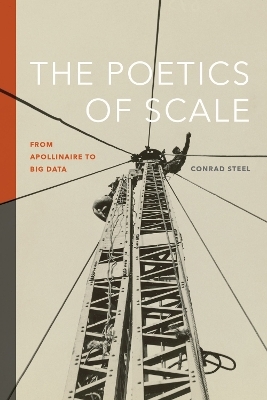
The Poetics of Scale
From Apollinaire to Big Data
Seiten
2024
University of Iowa Press (Verlag)
978-1-60938-931-4 (ISBN)
University of Iowa Press (Verlag)
978-1-60938-931-4 (ISBN)
Shows how the history of poetry - with its particular formal affordances, and the particular hopes and fears we invest it with - has always been bound with our changing logistics of macroscale representation.
Since the start of the twentieth century, poets have been irresistibly drawn to the image of the poem as a kind of data-handling, a way of mediating between the divergent scales of aesthetics and infrastructure, language and technology. Conrad Steel shows how the history of poetry—with its particular formal affordances, and the particular hopes and fears we invest it with—has always been bound with our changing logistics of macroscale representation. This history takes us back to the years before the First World War in Paris, where the poet Guillaume Apollinaire claimed to have invented a new mode of poetry large enough to take on the challenges of the coming twentieth century.
The Poetics of Scale follows Apollinaire’s ideas across the Atlantic and examines how and why his work became such a vital source of inspiration for American poets through the era of intensive American economic expansion and up to the present day. Threading together Apollinaire’s work in the 1910s with three of his American successors—Louis Zukofsky in the 1930s, Allen Ginsberg in the 1950s, and Alice Notley from the 1970s onward—it shows how poetry as a cultural technique became the crucial test case for the scale of our collective imagination.
Since the start of the twentieth century, poets have been irresistibly drawn to the image of the poem as a kind of data-handling, a way of mediating between the divergent scales of aesthetics and infrastructure, language and technology. Conrad Steel shows how the history of poetry—with its particular formal affordances, and the particular hopes and fears we invest it with—has always been bound with our changing logistics of macroscale representation. This history takes us back to the years before the First World War in Paris, where the poet Guillaume Apollinaire claimed to have invented a new mode of poetry large enough to take on the challenges of the coming twentieth century.
The Poetics of Scale follows Apollinaire’s ideas across the Atlantic and examines how and why his work became such a vital source of inspiration for American poets through the era of intensive American economic expansion and up to the present day. Threading together Apollinaire’s work in the 1910s with three of his American successors—Louis Zukofsky in the 1930s, Allen Ginsberg in the 1950s, and Alice Notley from the 1970s onward—it shows how poetry as a cultural technique became the crucial test case for the scale of our collective imagination.
Conrad Steel is a writer and researcher. He lives in London, England.
| Erscheinungsdatum | 02.03.2024 |
|---|---|
| Reihe/Serie | Contemporary North American Poetry |
| Verlagsort | Iowa |
| Sprache | englisch |
| Maße | 152 x 229 mm |
| Gewicht | 272 g |
| Themenwelt | Geisteswissenschaften ► Sprach- / Literaturwissenschaft ► Anglistik / Amerikanistik |
| Geisteswissenschaften ► Sprach- / Literaturwissenschaft ► Literaturwissenschaft | |
| ISBN-10 | 1-60938-931-X / 160938931X |
| ISBN-13 | 978-1-60938-931-4 / 9781609389314 |
| Zustand | Neuware |
| Haben Sie eine Frage zum Produkt? |
Mehr entdecken
aus dem Bereich
aus dem Bereich
Poetik eines sozialen Urteils
Buch | Hardcover (2023)
De Gruyter (Verlag)
CHF 83,90
Entzauberung und Faszination des Immergleichen in Literatur und Film
Buch | Softcover (2024)
Springer Fachmedien Wiesbaden GmbH (Verlag)
CHF 118,95
Buch | Softcover (2024)
belleville (Verlag)
CHF 27,95


